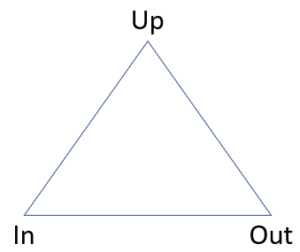
Discipleship is a boring word for the Christian adventure. You don’t need discipled if you’re not doing anything interesting. My definition of a Christian is a person who is following the Living Christ. It is important to note that the Living Christ is always on the move, wandering into dangerous areas and befriending broken people, and bringing peace largely through the palpable presence of the Holy Spirit. The Living Christ is not, as we often picture, sitting around the church building, waiting for another wonderful Sunday of praise and worship.
The Christian life then becomes one of tracking the movements of Jesus in the world and seeing how we might join in transforming work. Our story moves from one of sinners who never quite get it right, always frustrating the holy righteousness of God to one of saints who stumble from time to time as they give their hearts and resources toward transforming the world around them. The nature of discipleship is fully dependent on the story in which you find yourself.
So what is the story we find ourselves in?
“Always grab the reader by the throat in the first paragraph, sink your thumbs into his windpipe in the second, and hold him against the wall until the tagline.” – Paul O’Neil
In the first few lines of the Gospel of Matthew, we are presented with the history of Israel in three movements. The first movement is the adventure of Abraham. He was the Christopher Columbus of his day. He was an explorer, who left everything he knew, his home, his people, his parents, and set out to find a better place where his descendants could thrive. Along the way, he encountered all sorts of impossible troubles and poured out all kinds of blessings on family and strangers alike.
The second act of Israel’s history revolves around King David, who has become the most beloved leader of the land that Abraham discovered. His story is a one of courage, loyalty, and righteousness, mixed in with some personal struggles. David is not content with staying within his border. He desires to bring justice and flourishing to his neighbors. The people love him because he seems focused on the betterment of all rather than, as most kings, a focus on his own development.
The third act is surprising. It is heartbreaking. The spirit of adventure and blessing that came with Abraham and David is gone. The people have been scattered. Others now rule over them without concern for the betterment of anyone but the emperor of Rome. Some are slaves, most live without basic human rights, all feel stuck, mired in hopelessness. They are looking for a Savior.
Enter Jesus.
He walks up on the hill (Matthew 5, 6, & 7) and delivers the sermon of all sermons. He lays out stunning truth that stirs up grand awareness of our selfishness and challenges us to live outside of ourselves, to love and bless those around us. He calls all people to be generous, forgiving, and trustworthy. He teaches them to pray, “Thy Kingdom come, thy will be done, on earth as it is in heaven.” He calls for the world to be transformed and restored to a place where people can live a full and meaningful life.
Not just a man of words, Jesus then walks down the hill (Matthew 8) and into the lives of three broken people (I’ll say more about them in a minute) who were ignored and despised. He brings healing and forgiveness and restores to them a freedom to thrive.
The story of a disciple is to walk up the hill of personal challenge and down the hill of public transformation. This is where discipleship becomes indispensable. Challenge and transformation are more effective with a coach.

The simplest discipleship model I have observed is from Building a Discipleship Culture by Mike Breen.
The Christian needs to be aware of three dimensions of their life. Up is their relationship with the Living Christ, hearing and knowing. Out is their relationship with the broken world, empathizing and transforming. In is their relationship with Christian brothers and sisters, encouraging and partnering.
Let’s first look Up.
We see a beautiful picture of Up in Isaiah 6, when the prophet is brought into the powerful presence of God and immediately becomes aware of his sin. He is a man of “unclean lips” among a people of “unclean lips.” With this recognition, an angel flies to him and cleanses him mouth with a hot coal. The restoration is quick and clean. The guilt is gone, and God moves to more important matters. The Lord asks the prophet, “Whom shall I send? And who will go for me?”
According to Breen, the disciple must learn to constantly ask two questions,
“What is God saying to me?”
“What am I going to do about it?”
The coach does not know the answer to these questions. These are questions for the disciple to wrestle with. The coach asks questions, makes observations, and often states Biblical truths with the hope of stirring an awareness of God’s will within the disciple.
How does God speak? In many ways! Through Scripture, through dreams, through others, through spiritual whispers, through small and large trials, through small and large blessings, and once in a while (once in my own life), through audible words. The coach (the discipler) must become a master of great questions that help the disciple unravel the often cryptic words of God for their own life.
As the answer to the first question “What is God saying to me?” becomes clear, the discipler moves to the second question, “What am I going to do about it?” This sounds just like the arena of a coach in helping to plan action and build accountability.
Let’s next look Out.
It is often in looking Out that we begin to see what God is calling us to do. When Jesus walked down the hill (Matthew 8), he encounters three broken people who were perhaps the most unseen people in the community. He sees a leper, a centurion, and a mother-in-law. Lepers were ignored because their plight was too overwhelming to consider. People wanted a separation to keep the brokenness far from them. Centurion were ignored because they were the oppressor. We tend to think the oppressor deserves no help but gets what he deserves. Yet when Jesus looked Out, he saw the oppressor’s problem as his own and immediately offered to help.
“What breaks your heart in the community?”
“What experiences, resources, or gifts do I have that might be of some help?”
“How might a transformed community look different?”
Looking Out requires a vulnerability, a willingness to connect with pain and difficulty that are not our own. It is a selfless act that requires a level of maturity not found outside of disciples. Each person will need to grow into the type of person who is capable of bravely looking out.
Let’s certainly look In.
We are not on this adventure alone. The Apostle Paul drew a wonderful picture for us that together we become the body of Christ, moving “easily and rhythmically together,” as Eugene Peterson says in The Message’s translation of Ephesians 4. If you’ve been part of a church fellowship, you will have noticed that at times, easy and rhythmic are not accurate descriptors!
“What role can I play in the larger group as we look Out toward the broken world?”
“How are others seeing this issue in ways that are surprising and maybe even disturbing to me?”
“How can I be an encouragement to those around me who are on this daunting adventure?”
The coach asks questions to build awareness.



1 thought on “Question Fostered Discipleship”
Hi Brian Miller!
So appreciate you sharing around this topic of what it means to being a Christ follower. I especially enjoyed Mike Breen’s Building a Discipleship Culture Model. Love the images and the language being shared here. Throughout these last couple of months, I have recently been experiencing a lot of the “IN” approach which has been such a blessing for me. Today the word “discipleship” can be seen in a whole different light when you compare it to a “Christ follower.” Could the same thing be said about being called a “Christian?” I have a dear friend of mine who is currently struggling with the people in his church not really showing any serious interest in wanting to grow in Christ or in their gifting. They’ve always been used to just showing up and attending church and that’s all they want to do. I’ve also written a song that speaks to the “OUT” approach to following Christ. Maybe I’ll share it with you some time. As always, thank you Brian for writing such an encouraging and insightful blog.
Thanks CAM!